ST Engineering has discontinued its autonomous bus development efforts in late 2022, citing the ‘significant’ financial resources required.
As announced by ST Engineering in February 2023 with the release of its financial results and annual report, the local engineering firm had wound up its Autonomous Bus unit that was started in late 2015. Although ST Engineering claims significant technological progress has been made, further technical and operational milestones have yet to be achieved, and the company had thus decided to withdraw from further autonomous bus development owing to the ‘substantial’ financial resources required.
Between 2015 and 2022, ST Engineering partnered with various organizations and agencies to develop and field autonomous buses. One such effort was its partnership with LTA to develop and integrate autonomous vehicle (AV) technologies onto 12-metre buses, with an eventual goal of being capable of running fixed and scheduled bus services for intra- and inter-town travel. The firm also involved itself in trialling several autonomous minibuses and shuttles.
ST Engineering also participated in several public trials, including a 2019 public trial in Sentosa lasting 3 months, and 2021 revenue service trials at Science Park 2 and Jurong Island, each lasting four months.
‘Significant’ financial resources required
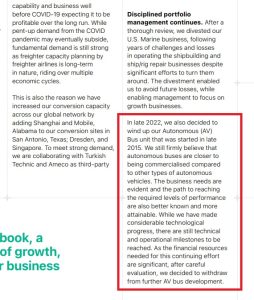
During ST Engineering’s results briefing on 24 February 2023, Chief Executive Officer (CEO) Vincent Chong addressed the substantial financial requirements associated with the company’s ongoing development of autonomous bus (AV bus) technology, estimating that the project would necessitate spending at least S$150 million over the next five to seven years. Chong emphasised the company’s disciplined approach, stating, “We are also committed to withdrawing from projects when the financial conditions are no longer conducive for further investments.”
In a separate interview with The Business Times, Chew Men Leong, the President of Urban Solutions at ST Engineering, explained that the company had successfully transformed a concept into a prototype and was currently developing a business case to determine the path towards commercializing the project. However, due to the substantial resources required for further development, co-investment support became necessary. Chew Men Leong stated, “The investment climate is not particularly favourable at this time, especially for technology, and the market does not appear to be fully prepared.” The company chose not to disclose the exact amount invested in autonomous vehicles (AVs) up to this point.
In response to ST Engineering’s announcement, the Land Transport Authority (LTA) and Economic Development Board (EDB) have affirmed their commitment to collaborating with partners and stakeholders to support autonomous vehicle (AV) trials and deployment. They acknowledged difficulties surfaced by other companies as part of the AV Call-for-Collaboration (CFC), which was initiated in 2019 with the objective of deploying AVs as a form of public or shared transport. LTA and EDB also stated that they are currently deliberating on the next steps for the CFC.
External reading: LTA, EDB to push on with autonomous vehicle development despite ST Engineering’s withdrawal from bus trials, Singapore – THE BUSINESS TIMES (Accessed 30 Jun 2023)
More on Autonomous Buses
Autonomous Buses in Singapore | Land Transport Guru
Vehicles
ST Engineering’s autonomous bus development effort involved various autonomous electric vehicles, ranging from compact electric shuttles measuring 4 meters in length, to full-size buses measuring 12 meters in length.
ST Engineering-Linkker Autonomous Buses
Main Articles: STE-Linkker Autonomous Electric Bus & ST Engineering STROBO Series 12 Bus
In April 2017, ST Kinetics (later ST Engineering Land Systems) signed a partnership with LTA to develop and trial autonomous buses. Under this partnership, ST would develop Autonomous Vehicle (AV) technologies and integrate them onto two 12-metre electric buses. These prototype vehicles would undergo a three-and-a-half-year period of road trials expected to begin in mid-2020, with the eventual goal to develop autonomous buses capable of running fixed and scheduled bus services for intra- and inter-town travel. Included in the announcement was ST Engineering’s concept sketch for a prototype autonomous bus featuring 3 doors.
In 2018, two of these autonomous buses were brought in by ST Engineering (both covered in this article). The first bus, based on the Linkker 12+ city bus (registered RD3151T), features a low-entry layout with three doors and a set of steps for the third door.
The second bus is based on the Linkker 12 LF (registered RD3165D), a full-low-floor three-door bus bearing a prototype bodywork design built by Gemilang Coachworks resembling the concept sketches first revealed in 2017. The latter would feature more prominently in ST Engineering promotional materials and trade shows, and for a period of time, was also branded as the STROBO Series 12.
Both buses were used for autonomous bus research and development, including a four-month public trial at Jurong Island in 2021.
Minibuses
ST Autobus
Main Article: ST Autonomous Mini-Bus (Autobus)
An autonomous vehicle developed by ST Engineering Land Systems, based on a Yinlong electric minibus platform. Two such vehicles were developed, and these vehicles participated in several public showcases and trials.
In 2019, these buses participated in a three-month public trial in Sentosa, where commuters could hail the autonomous buses via their smartphones or at designated kiosks at certain stops along the route. In 2021, these buses also featured in a four-month public trial at Science Park 2.
These buses were registered RD3177U & RD3178S (formerly RD3153M & RD3154K; re-registered sometime around 2020).
ST Engineering STROBO Series 7 Bus
Main Article: ST Engineering STROBO Series 7 Bus
This bus is a BYD K6 electric bus fitted with the ST Engineering AV kit, as part of a partnership between ST Engineering and BYD. The bus was exhibited during the ITS World Congress 2019 in Singapore and subsequently registered as RD3174C in 2020. No known public trials of this bus were carried out.
Autonomous Shuttles
EasyMile EZ10
Main Article: EasyMile EZ10
ST Engineering was involved in the deployment of the Auto Rider, an autonomous electric shuttle using the EasyMile EZ10 vehicle. A two-week trial was conducted in 2015, followed by an official launch in June 2016 for public rides.
See also: Autonomous vehicle trials to hit public areas including Gardens by the Bay soon | The Straits Times
Navya Autonom
Main Article: Navya Autonom Shuttle
An autonomous shuttle developed by French firm Navya, previously known as the Navya Arma. In 2019, two units registered RD3155H and RD3156E participated in a 3-month trial in Sentosa led by ST Engineering. A third unit was registered RD3170M.
ST Engineering was also involved in Navya Autonom’s various other trials, such as at Gardens by the Bay, Kranji Camp III, Paya Lebar Air Base, and Jurong Lake Gardens.
Annual Report Statement
” In late 2022, we also decided to wind up our Autonomous (AV) Bus unit that was started in late 2015. We still firmly believe that autonomous buses are closer to being commercialised compared to other types of autonomous vehicles. The business needs are evident and the path to reaching the required levels of performance are also better known and more attainable. While we have made considerable technological progress, there are still technical and operational milestones to be reached. As the financial resources needed for this continuing effort are significant, after careful evaluation, we decided to withdraw from further AV bus development.”
External Links & References:
- Annual Reports | ST Engineering (stengg.com) (Accessed 29 Jun 2023)
- LTA, EDB to push on with autonomous vehicle development despite ST Engineering’s withdrawal from bus trials, Singapore – THE BUSINESS TIMES (Accessed 29 Jun 2023)

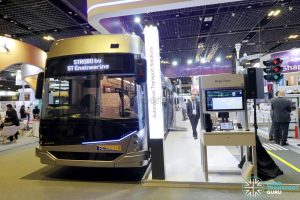
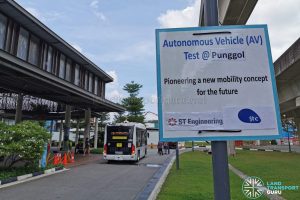
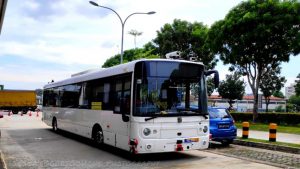
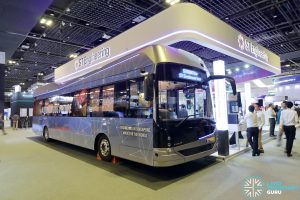
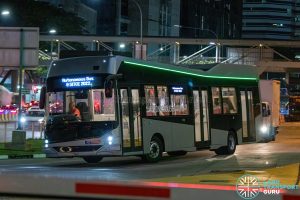
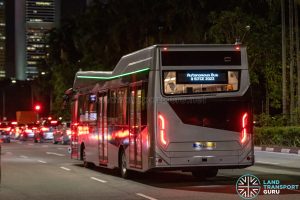
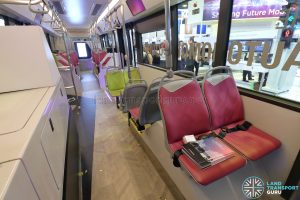
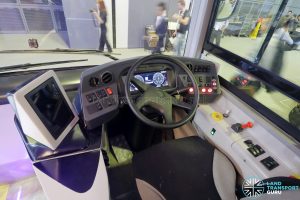
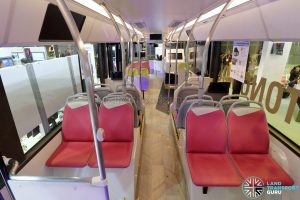
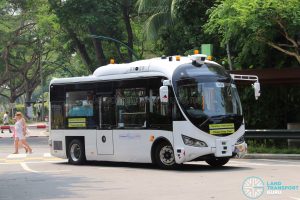
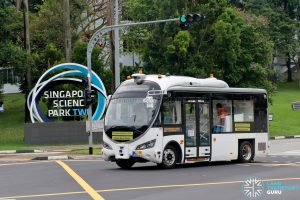
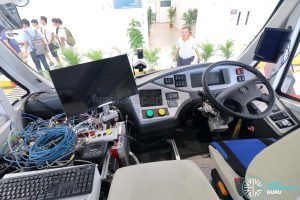
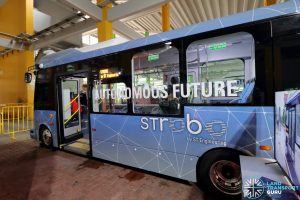

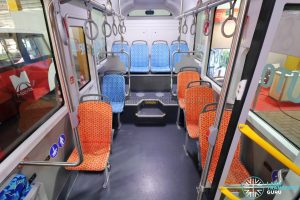
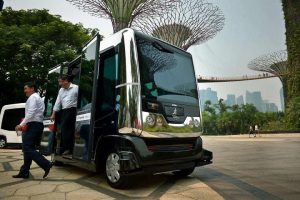
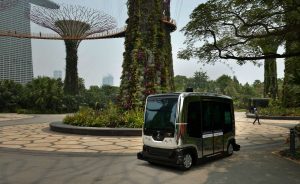
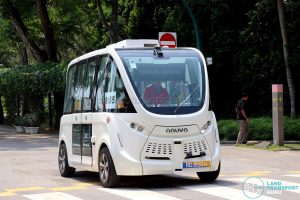
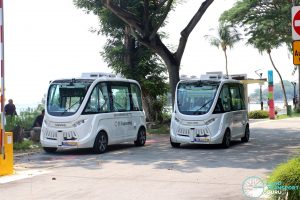
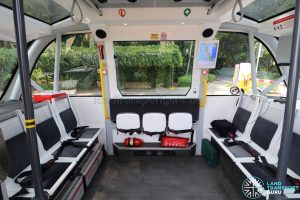
Should divert the engineering resources to create new initiatives such as autonomous senior management or autonomous project managers. In the long run, these will all lead to actual cost savings while growing the technical capability of the group.
Lol. If I read you correctly, overhead is also part of the “‘substantial’ financial resources required”. So to make “them” autonomous, the hope is to reduce the cost.
I hope instead of wasting the two 12m buses. LTA can convert them to normal electric buses and deploy them on service. Maybe on service 502
This is really depends on the purchasing model if LTA wants to own or owning these buses and having on the road will leave behind what SG Bus history story. All else, to cut lost, just scrap all the buses! Keeping it means you need to spend $ to maintain.
RD (research and development) plate buses by law cannot be converted to regular buses